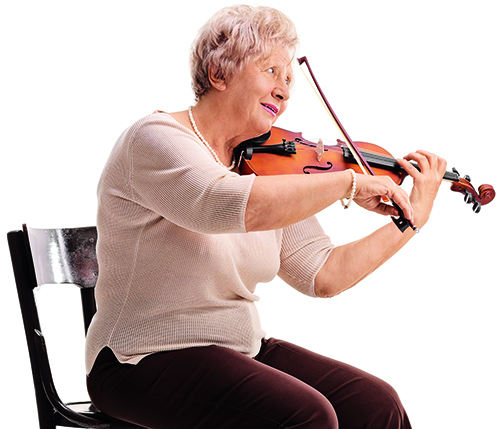Find out why a hobby is so much more than a way to pass the time
By Wendy Haaf
Photo: iStock/monkeybusinessimages.
Doing crossword puzzles, attending dance lessons, and taking up quilting, digital photography, or knitting aren’t just ways to fill your days after you retire. A growing body of evidence suggests that such pastimes confer a host of benefits, particularly for those of us who have passed the half-century mark, promoting overall physical and mental health, helping you manage stress and bolster your thinking skills, and reducing your risk for dementia. Here’s just a sampling of what we know about how leisure activities contribute to healthy aging, as well as the qualities to look for when choosing a hobby—or two or three.
“One thing we know from research is that hobbies can be really good for your brain,” notes Angela Troyer, the professional practice chief of psychology and program director of the Neuropsychology and Cognitive Health program at Baycrest in Toronto. “Some activities actually result in you growing new brain cells, retaining the brain cells you have, or increasing the connections between brain cells.” (Changes like these are believed to help both compensate for age-related changes—such as a decreased ability to tune out irrelevant information—and prolong normal function if in fact one of the brain diseases underlying dementia does begin to develop.)
“Related to that is that hobbies can help people with their thinking skills,” Troyer adds. “Depending on what the particular activity is, they can help people improve their attention, their memory for certain things, problem-solving, or abstraction skills.” Perhaps not so incidentally, according to some research, “When people retire, there’s a drop in their cognition; there’s a drop in their IQ,” notes Sylvie Belleville, the scientific director of the University of Montreal’s Geriatric Institute.
There’s also a smattering of studies hinting that at least some leisure activities can help foster better physical well-being, even when they’re started later in life. For example, in one 2006 trial involving 166 adults with an average age of 80, those who were randomly assigned to participate in a professionally conducted group singing program were faring better after 12 months, compared with control subjects, in a variety of ways, reporting a higher level of overall health, fewer doctor visits, less medication use, and fewer falls.
And finally, hobbies seem to help nurture mental health by buffering stress, anxiety, and depressive symptoms. (The same studies Belleville noted above also showed an uptick in lessening depression after retirement.)
So what should you look for in a hobby?
Active, Engaged, and Challenged
One aspect to consider is “whether an activity keeps you physically active,” Troyer says, “whether it’s playing golf, birdwatching, or something else where you’re walking around. There are lots of benefits in that.”
Apart from the obvious (such as helping to keep a lid on dementia risk factors such as elevated blood pressure and blood sugar levels), both aerobic and resistance exercise appear to promote healthy changes in the brain. For example, studies show that the hippocampus (an area of the brain that plays a key role in memory) actually increases in volume in sedentary older adults who start and stick to an aerobic exercise program (walking, with gradual increases in intensity).
Another key component is social engagement—not just interacting with other people, but building friendships and support networks.
“One of the things we’re finding is that social engagement and maintaining your social networks is hugely important to your psychological and emotional well-being,” notes Janet Fast, a professor of human ecology and a co-director of the Research on Aging Policies and Practice program at the University of Alberta, in Edmonton. For one thing, Troyer says, “People who are physically and socially active tend to have better moods, and thus fewer feelings of being depressed. They also tend to be able to manage stress better—they feel less stressed and anxious.” What’s more, Fast says, “there’s a very strong connection between social participation, social relationships, and physical health.”
But what if in-person get-togethers are hard to arrange because you live in a rural community or have mobility issues? The results of a small (14-participant) preliminary study provide a clue: “Online activities could possibly be another way of getting that social and cognitive engagement,” says Nicole Anderson, a senior scientist at Baycrest’s Rotman Research Institute and an associate professor of psychiatry and psychology at the University of Toronto. Specifically, older adults who learned how to befriend others within a Facebook group experienced a 25 per cent improvement in a skill requiring working memory, while those who learned to post to an online diary site saw no such gains.
Forming the final side of the triangle is a factor called cognitive activity. “There’s lots of evidence showing that the more cognitively active you are, and the more complex those cognitive activities are, the better your cognitive health and the lower your risk for dementia as you age,” Anderson explains. Some of this information comes from “large studies, looking at what people do in their lives and rating the level of cognitive challenge that a hobby carries, and whether that’s related to dementia and cognitive decline,” Belleville says. “And yes, that is the case.” (It’s worth noting that social activities, such as conversing with friends, can be cognitively demanding, as can pursuits requiring planning and problem-solving, such as woodworking, quilting, and knitting.)
Novelty, too, is important, since it plays a role in determining how mentally demanding you find a particular pursuit. “For example, if you play the piano, a new piece is very challenging and you really have to think about it,” Troyer says, “but the more you do it, sometimes you can play it without even thinking about it. Then it’s time to learn a new piece. Or if you get to the point where you can do Sudoku puzzles easily, then it’s time to move on to a new level, so you’re always thinking hard to get the full benefit.”
On the other hand, activities involving learned sequences of repetitive movements, such as tai chi, yoga, and knitting, may offer a different type of value after you’ve achieved basic mastery and you’re thus able to achieve a state of “flow,” or deep absorption. Some evidence suggests these repetitive movements may act as a sort of active meditation, inducing relaxation, decreasing rumination, and even lowering blood pressure.

Photo: iStock/Ljupco.
Of course, you can also change things up periodically by trying out an activity you’ve never done before. “The problem is if you always do the same thing, you become an expert in that particular thing and you don’t go out of your comfort zone,” Belleville says. “Clearly, the data seems to indicate that variety is important.” By doing a diverse range of activities, you’ll also exercise different brain regions and skills.
“You want things that use your verbal skills, things that require more visual spatial reasoning [the ability to tell where an object is in space], and things that move you around, because they all provide different benefits,” Troyer explains. Some pursuits combine several of these ingredients. For example, if you sign up for a dance class, “it stimulates your memory, because you have to learn the steps,” Belleville says. Planning, controlling, coordinating, and executing the movements taxes several different areas of the brain, and swirling around the floor with a partner or group involves social interplay. Plus, “It’s also an exercise for your heart,” Belleville says.
Creativity, too, may be a useful addition to the secret sauce. In one study involving 221 older adults, those who took group classes to learn an unfamiliar creative skill (digital photography, quilt-making, or both) showed significant improvements in episodic memory and visual spatial processing.
The final critical element? Enjoyment. If you choose activities that give you pleasure and feelings of accomplishment, you’re more apt to persist even when the going gets tough.
Troyer and her colleagues emphasize several of these points in programs Baycrest runs for older adults who are concerned about memory loss. By keeping us physically, mentally, and socially engaged, she says, hobbies “can certainly help people maximize the abilities that they have and maintain themselves at a higher level for longer.” So go forth and have fun—doctor’s orders.



